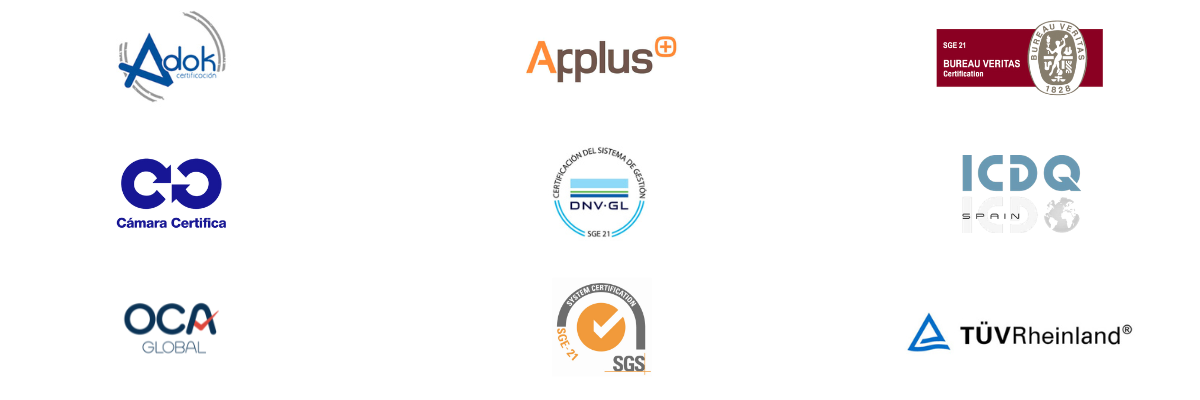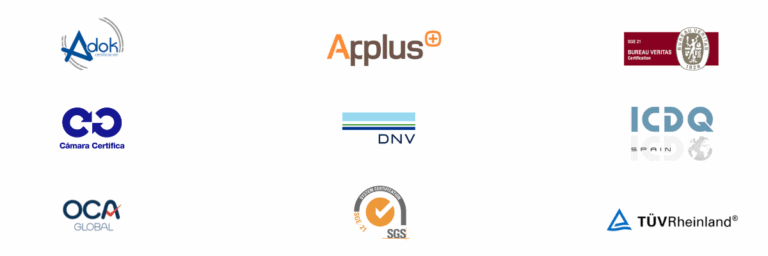
What is the SGE 21?
Es la primera norma europea que permite implantar, auditar y certificar un sistema de gestión ética, sostenible y responsable.
La SGE 21 constituye una herramienta clave para la integración de los aspectos ambientales, sociales y de buen gobierno en la gestión de empresas y organizaciones de todo tipo.
La Norma desarrolla los requisitos que permiten establecer, implantar y evaluar en las organizaciones el Sistema de Gestión Ética, Sostenible y Responsable propuesto por Forética. Implantar este sistema supone un convencimiento para la dirección de la organización de su capacidad de generar un liderazgo responsable.
Posee un enfoque holístico de la sostenibilidad.
Permite una mejor gestión de los riesgos de sostenibilidad
Promueve una cultura responsable en la organización.
Facilita el acceso a nuevos clientes que incorporan en sus criterios de contratación aspectos ambientales, sociales y de buen gobierno (tales como administraciones públicas o grandes corporaciones).
Es fácilmente integrable con otros sistemas de gestión.
Permite gestionar los riesgos potenciales, además de la salud y bienestar e los trabajadores.

Facilita la obtención de información e indicadores de Responsabilidad Social.
Ayuda a demostrar a los grupos de interés el compromiso real de la organización con la gestión de la sostenibilidad, generando confianza.
Contribuye a la credibilidad y confianza de la organización gracias a los procesos de revisión y reconocimiento externo.
Impulsa mejora continua, evaluando y ajustando constantemente los procesos para adaptarse a cambios y mejora.
Agiliza el cumplimiento normativo de normas y estándares, al estar actualizada con las últimas tendencias de sostenibilidad.
Entidades certificadas
La Norma SGE 21 ofrece una estructura clara para integrar la sostenibilidad en todas las áreas de la organización, y está diseñada para adaptarse a todo tipo de entidades, desde microempresas hasta grandes corporaciones y organizaciones del tercer sector.
Cada día son más las empresas que confían en la Norma SGE 21 como su sistema de gestión ética, sostenible y responsable.
La Norma SGE 21 ofrece una estructura clara para integrar la sostenibilidad en todas las áreas de la organización, y está diseñada para adaptarse a todo tipo de entidades, desde microempresas hasta grandes corporaciones y organizaciones del tercer sector.
Cada día son más las empresas que confían en la Norma SGE 21 como su sistema de gestión ética, sostenible y responsable.
Se trata de una evaluación por parte de Forética del nivel de aplicación de los requisitos de la Norma en una organización a través de una revisión documental y recogida de evidencias en la información pública de dicha entidad. A través de este proceso se obtiene una validación del uso de la metodología de gestión que plantea la Norma en un momento determinado.
El proceso de evaluación de la conformidad lo lleva a cabo Forética a través de profesionales homologados para ello según las siguientes consideraciones:
- It is a documentary review of the information provided by the company (self-declaration) and of evidence obtained through the public information of such entity.
- Includes the 9 management areas considered by the SGE 21
- No implica una evaluación exhaustiva de todos y cada uno de los requisitos de la norma, pero sí permite tener una primera aproximación del grado de desarrollo de la sostenibilidad en la organización, tomando como referencia este estándar internacional.
Si se requiere un proceso de evaluación más detallado, exhaustivo y presencial, el proceso de certificación a través una entidad auditora, es la opción más adecuada.
You can learn more about the conformity assessment process here.
For more information, please contact sge21@foretica.es
Ventajas de su implementación
La SGE 21 proporciona una estructura clara y lógica para abordar la sostenibilidad de forma transversal, implicando a todas las áreas de la organización.
Diseñada para todo tipo de organizaciones: desde microempresas hasta grandes multinacionales, pasando por ONGs y entidades académicas.
Se integra fácilmente con normas como calidad, medio ambiente o salud y seguridad, permitiendo auditorías conjuntas y reduciendo costes.
Está alineada con las últimas exigencias europeas e internacionales, facilitando el cumplimiento de normativas en constante evolución.
Ayuda a identificar, evaluar y mitigar riesgos sociales, ambientales y de gobernanza.

Promueve valores éticos y sostenibles en todos los niveles de la organización, fortaleciendo la cohesión interna y el compromiso del equipo.
Mejora la competitividad al cumplir con los criterios ambientales, sociales y de buen gobierno exigidos por grandes corporaciones y administraciones públicas.
Facilita la generación de indicadores de sostenibilidad y demuestra el compromiso real ante los grupos de interés.
El proceso de auditoría externa refuerza la imagen de la organización y genera confianza en clientes, inversores y la sociedad.
Establece una hoja de ruta para evaluar, ajustar y mejorar constantemente el desempeño sostenible de la organización.
Certification process
To begin the certification process, the organization -through an authorized representative- is required to provide Forética with the necessary information by filling out the following Certification Request Form
Para más información sobre la solicitud de certificación ponte en contacto con sge21@foretica.es
La oferta será elaborada en función de los criterios establecidos para la asignación de jornadas de auditoría y de las tarifas vigentes a fecha de la petición del presupuesto, siendo las únicas ofertas válidas las que sean emitidas directamente por Forética. Será el cliente quien decida la entidad auditora de Forética con la que quiera llevar a cabo la certificación de su sistema de gestión.
Una vez aprobada la oferta, el auditor designado por la entidad auditora elegida, elabora el plan de auditoría según el formato facilitado por Forética. Este documento será remitido al cliente y se pondrá en conocimiento de Forética la fecha seleccionada para la auditoría.
La auditoría inicial consta de dos fases, la fase 1 es la revisión documental y generalmente no requiere visita presencial del equipo auditor, y la fase 2 es la auditoría in situ en la que se recogen las evidencias correspondientes a través de entrevistas personales con los distintos responsables implicados, visita a las instalaciones y revisión de registros. Las auditorías de seguimiento y renovación no requieren la realización de fase 1.
Una vez finalizadas la auditoría - de fase II - y cerradas las no conformidades, en caso de que las hubiese, las entidades auditoras llevarán a cabo la revisión técnica de los registros de auditoría y la recomendación sobre la emisión del certificado según corresponda.
Tras la valoración favorable de la entidad auditora, Forética tomará la decisión de certificación y emitirá un certificado que será válido por un período de tres años desde la fecha de dicha toma de decisión.
El mantenimiento de la validez de un certificado queda sometido al cumplimento de los requisitos de certificación.
Estructura y Áreas de gestión
La norma SGE 21 establece nueve áreas de gestión que corresponden a los principales grupos de interés y abordan los aspectos sociales, ambientales y de buen gobierno claves para la empresa u organización. Para cada una de estas áreas se establecen una serie de requisitos – recogidos en el texto de la norma – en los que se basará tanto la implantación del sistema de gestión como la auditoría.









Es el área de gestión central de la norma, ya que implica la involucración de la alta dirección en el proceso y es clave para trasladar el mensaje y definir las directrices de la gestión responsable a todos los niveles organizativos. Las últimas novedades en este área buscan su alineación con los requisitos regulatorios europeos.
One of the main values of organizations is their employees. That is why guaranteeing their rights, their opportunities, their capacity for professional and personal development and their well-being is essential for the success of organizations.
Customers, understood as all buyers, consumers or users of an organization's products or services, are essential to the sustainability of the business. It is therefore essential to consider and respond appropriately to their needs and interests.
Having suppliers aligned with the philosophy of responsible management is a fundamental factor in ensuring the consistency of actions as well as sustainable production and consumption.
Organizations and companies must be aware of their impact and level of influence on the social environment in which they operate and try to contribute in a positive way.
All organizations, regardless of their size and activity, have an impact on the environment in which they operate. Responsible management means promoting environmental sustainability.
Los inversores tienen un papel muy relevante en la financiación, operación, gestión y control de una empresa u organización. La norma SGE 21 pretende, en este punto, fortalecer la gobernanza de la organización a través del cumplimiento de varios requisitos.
Una empresa u organización con una gestión responsable ha de velar por un comportamiento íntegro y respetuoso con sus competidoras, fomentando incluso la colaboración en pro de la sostenibilidad del sector o mercado en el que se encuentra.
La principal responsabilidad de una organización o empresa es cumplir la legislación y normativa establecida desde los entes públicos. Se considera importante además mantener un entendimiento y comunicación con las administraciones públicas en lo que respecta al fomento de la sostenibilidad.
Application
Las empresas y organizaciones pueden escoger la SGE 21 como estándar de referencia para guiar sus pasos en la integración de los aspectos ambientales, sociales y de buen gobierno en su estrategia y gestión. Debido a sus características, la norma se presenta como una herramienta adecuada para ser utilizada internamente en el proceso de sistematización de la sostenibilidad.
Adicionalmente, la norma prevé la opción de que las empresas y organizaciones que la utilizan puedan obtener un elemento de demostración externa, que así lo indique.
La evaluación del cumplimiento de esta Norma implica adquirir voluntariamente un compromiso con la sostenibilidad en materia económica, social y ambiental. Además, supone aplicar los valores éticos, demostrarlos y mantenerlos.
This evaluation can be done in two ways:
El proceso de certificación se lleva a cabo exclusivamente a través de entidades auditoras homologadas por Forética en ciclos de certificación de tres años (auditoría inicial el primer año y auditorías de seguimiento en los dos años posteriores).
Entidades auditoras de Forética:

The entity that passes the audits receives a certificate that accredits it on behalf of the certifying entity that carried out the audit and Forética.
This option is especially interesting for those organizations with a purpose of continuous improvement through management systems and for which obtaining a certification in the SGE 21 standard is an element of differentiation and recognition.
For more information on the certification process, please contact sge21@foretica.es.
Evaluation by Forética of the level of application of the requirements of the Standard in an organization through a documentary review and collection of evidence in the public information of the entity. Through this process, validation is obtained of the use of the management methodology proposed by the Standard at a given time.
The conformity assessment process is carried out by Forética through professionals approved for this purpose according to the following considerations:
- It is a documentary review of the information provided by the company (self-declaration) and of evidence obtained through the public information of such entity.
- Includes the 9 management areas considered by the SGE 21
- No implica una evaluación exhaustiva de todos y cada uno de los requisitos de la norma, pero sí permite tener una primera aproximación del grado de desarrollo de la sostenibilidad en la organización, tomando como referencia este estándar internacional.
Si se requiere un proceso de evaluación más detallado, exhaustivo y presencial, el proceso de certificación a través una entidad auditora, es la opción más adecuada.
You can learn more about the conformity assessment process here.
For more information, please contact sge21@foretica.es
Fórmate en la SGE 21
Preguntas frecuentes (FAQ)
La Norma SGE 21 es propiedad de Forética, sociedad referente en temas de sostenibilidad. Para su certificación, existe un proceso independiente, y las auditorías se llevan a cabo a través de entidades auditoras homologadas por Forética. Éstas, a su vez, cuentan con auditores formados en la Norma y en otros sistemas de gestión.
Desde Forética recomendamos que el sistema lleve implantado 6 meses antes de realizar la auditoría de certificación. Garantizando que se han llevado a cabo las reuniones del comité de de sostenibilidad, la revisión de los documentos por parte de la alta dirección, así como se ha superado con éxito la auditoría interna.
El precio dependerá del número de empleados, del número de centros a certificar, de si se cuenta con alguna certificación ISO, de si es socio o no de Forética, entre otros.
El proceso de certificación dura aproximadamente entre 8 y 10 semanas si no se detectan no conformidades desde la aceptación del presupuesto hasta la emisión del certificado.
Forética dispone de los cauces para el tratamiento de quejas (sobre el servicio prestado por Forética o por las entidades certificadoras) y apelaciones (respecto a decisiones tomadas por Forética o la entidad de certificación) que pudieran ser formuladas. Ambos se canalizan a través del canal ético, disponible en el siguiente enlace.
Resources and documents of interest
Latest in Social Media
Hasta el 20 de diciembre, abierto plazo de solicitud de subvenciones de @jcyl para implantar #RSE en #pymes. Se considera proyecto subvencionable la prestación de servicios técnicos dirigidos a la obtención de una certificación como la @SGE21 de @foretica
https://t.ly/m0aCB
#AparejadoresMadrid, faithful to the challenges of transparency, integrity and sustainability, has renewed in 2022 its certificate under the SGE21:2017 Standard for Ethical and Socially Responsible Management granted by @foretica.
#SCR
📝 Are you looking to be able to implement, evaluate and internally audit an ethical and socially responsible management system in any organization?
Check out more information about our SGE 21 Standard course from @foretica. last places! ➡️ https://bit.ly/3xUW5wb
📝 La Norma SGE 21 de @foretica se encuentra entre los proyectos subvencionables por la @jcyl para la obtención de estándares y certificaciones en materia de responsabilidad social empresarial.
+info: https://bit.ly/3MRZWyo
+info sobre la Norma @SGE21: https://bit.ly/3MJGLa8
👩🏻🏫 La edición 2022 de la #ESGAcademy de
@Foretica se pone en marcha.
🎥 Descubre más detalles sobre el Curso Norma SGE 21 en este vídeo ➡️
👩💻👨💻 The #ESGAcademy of @Foretica organizes a new edition of the online course on the @SGE21 Standard.
Don't miss the opportunity to train in a reference system for the management of #ESG aspects.
📅 From May 30th to June 6th.
We are waiting for you! ➡ http://bit.ly/3xUW5wb
Project managers
We are in contact
Si tienes cualquier duda o pregunta relacionada con la SGE 21, escríbenos y te contestaremos lo antes posible.







